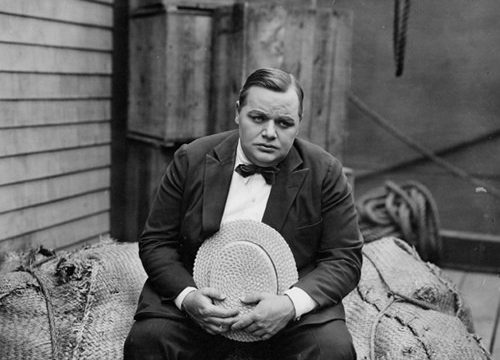The first “Fatty” Arbuckle short I’ve ever seen is in a Warner Archives collection of Vitaphone shorts. In fact, the disc begins with his sound shorts. It turns out that the idea that his career was completely destroyed by his trials is not entirely true, and that it’s believed he was about to sign a feature deal when he died. But he did become a symbol of the depravity of Hollywood in a lot of minds, and to this day, there are people who believe what is almost certainly a lie about him and aren’t aware that there’s no evidence for the claims—and that the jury on the third trial wrote a letter of apology that he’d been prosecuted at all.
He hated the name Fatty, even though his contract insisted that he remain over 250 pounds. He’d been called Fatty since school; at birth, he supposedly weighed over thirteen pounds. Because both his parents were slight, his father denied paternity. His early life was difficult, but he eventually made his way onto the stage and was quite a success; Caruso said that, with training, he could have been the second-best singer in the country. Arbuckle never made his weight the butt of the joke, and indeed he was an agile, graceful man, which was more likely to be the joke.
In 1913, Arbuckle and frequent costar Mabel Normand made the short “A Noise From the Deep.” It featured the first known example of a pie in the face. He liked sight gags and chases. He is the only person known to have worked with all three of the silent greats—he was Chaplin’s mentor, and he also worked with Lloyd and Keaton. In 1918, he was signed to a three-year contract at a million dollars a year. He was the first actor to be paid that much.
In 1916, however, he’d had an infection on his leg so bad that doctors considered amputation. His medical issues left him with a morphine addiction. This was at about the time that heroin use in Hollywood was becoming a national scandal. Then, in 1921, he was injured on set, suffering second-degree burns on both buttocks. To rest and recover, he and his friends Lowell Sherman and Fred Fishback traveled to San Francisco. They checked into the St. Francis Hotel for one of the most infamous parties in Hollywood history.
Arbuckle had known starlet Virginia Rappe for some years. (I don’t think I’ve ever seen any of her movies.) She, along with several other women, was invited to the party. Arbuckle found her in his bathroom vomiting. The hotel doctor was summoned, declared her drunk, and prescribed morphine. Two days later, she was still severely ill and was hospitalized. Maude Delmont, another woman who had attended the party, said that Rappe had said that Arbuckle raped her; the doctor found no evidence of rape, and Rappe herself never claimed to have been raped. This has not stopped popular belief from insisting that Arbuckle killed her. At the time, he was supposed to have raped her with a piece of ice or a bottle; he was also believed to have ruptured her bladder by his sheer weight.
I don’t believe it was so much the alleged rape that was the problem as much as it was the death—and the booze; all Arbuckle was ever convicted of was Volstead Act violations. But six days after Arbuckle was acquitted in Rappe’s death, Will Hays banned his pictures from appearing in theatres in the US. He was able to reconstruct his career eventually, though, and things were going better. He was married for the third time, and on his first anniversary, he was about to sign a feature contract. He said it was the happiest day of his life. It was also the last.
Arbuckle is one of those people without whom movies as we know them would not exist. Much of early comedy was shaped by him. It is a genuine tragedy what happened to Rabbe—one wonders if her life could have been saved if that first doctor had actually treated her. But it is also a tragedy that Arbuckle’s influence on film history is mostly just seen as leading to the institution of the Code.
Encourage fine research like this; consider supporting my Patreon!

